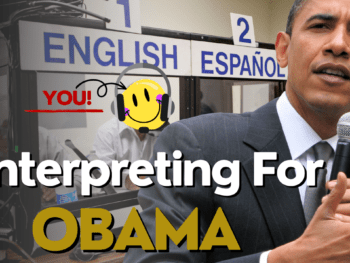Professional interpreters should aim practice to practice their skills every day, whether to learn interpretation or to keep their abilities sharp. This speech can be used both for simultaneous and consecutive interpreting: the happiest country in the world and the World Happiness Report. Note: The Speech starts STRAIGHT AWAY!
Topic(s): Institutions, Facts, UN
Terms: World Happiness Report, United Nations, metrics, happiness score, Human Development Index, Scandinavian, World Population Review, subjective well-being, GDP per capita, Social Support, Life expectancy, perception of corruption
Sources:
- https://worldhappiness.report/ed/2022/
- https://worldpopulationreview.com/country-rankings/hdi-by-country
- https://en.wikipedia.org/wiki/List_of_countries_by_suicide_rate
- https://worldpopulationreview.com/country-rankings/depression-rates-by-country
Also check these books to learn and practice interpreting.
Good For Practicing:
- Interpreting note-taking
- Consecutive Interpreting
- Simultaneous Interpreting
- Conference Interpreting
- Non-standard accent
- Lists
Also available on Speechpool.
If you’ve found this post helpful or think it could be useful to a friend who perhaps is – or is planning to become – an interpreter, please kindly consider buying me a coffee by using the button below:
I put all my heart and soul into the content I produce in order to help my fellow linguists set foot in the industry. Most of what I do is available to everyone for free.
Donating is 100% optional, but greatly appreciated. A short espresso will do! ☕
Script*:
*Please check the script only after you’ve done the note-taking exercise, otherwise that’s cheating! 🙂
‘The pursuit of happiness is arguably one of the most universal traits of humankind. Happiness is something that we seek to find throughout our entire lives, as many of us associate being happy with a sense of fulfilment.
Being such an important thing for humans, it may not surprise you that there is a (quote unquote) official world happiness index known as the World Happiness Report.
The report is published every year and it’s an initiative launched by the United Nations in 2012. The goal is to measure the level of happiness in more than 160 countries according to a number of metrics, which allow the researchers to produce a happiness score by country.
So, what country is the happiest on Earth? According to the 2022 data, it is Finland, with a 7.8 score – the highest in the world. In fact, let’s hear the top 10 happiest nations according to the report. Here it goes:
- Number 1, as already stated, is Finland, followed by:
- Denmark
- Iceland
- Switzerland
- The Netherlands
- Luxembourg
- Sweden
- Norway
- Israel
- and New Zealand
The United States are number 16 on the list, while the UK is number 17. Not bad, actually!
Now, you may have noticed a couple of things. First, nearly every country in the top 10 (and also the top 20, for that matter) is either in Northern Europe, Central Europe or North America.
Second, every single one of them is what most would consider to be a wealthy nation. As a matter of fact, if you compare the World Index Report with the Human Development Index of the same year, you will notice that the countries at the top of both lists are pretty much the same.
I find this a bit strange. How come the happiest nations in the world also happen to be the most developed ones? Is there really a correlation between the 2 things?
Also, if we look at it anecdotally, would you say that Scandinavian people are particularly happy? This may just sound as a stereotype coming from a Mediterranean person, and I really apologise in advance if it sounds as such, but in Southern Europe, where I’m originally from, when we think of happiness, Finland or Iceland are not countries that come to mind.
For instance, if you look at a much darker set of statistics, you’ll notice that Finland, the happiest nation in the world, has also one of the highest suicide rates: they are number 38 out of 183 countries, and if you just look at Europe, they are in the top 10.
In addition, they are number 9 when it comes to the Highest Rates of Depression in the entire world (according to the World Population Review). So, the happiest country is also one of the most depressed ones; makes sense, right?
So, maybe I should have started this speech by asking: what is happiness, after all? How can we actually define it?
The Cambridge Dictionary defines happiness as “the feeling of being happy”. That’s not very helpful, right?
If we then keep digging the dictionary, we find the following the definition of “happy”: “feeling, showing, or causing pleasure or satisfaction”. That’s a bit better, but again, it’s still such a vague definition.
In fact, happiness is such a subjective thing and so difficult to actually define, many psychologists prefer the term “subjective well-being”. What makes a person happy may be meaningless to another, or even bring him or her unhappiness.
When you look at the World Happiness Report’s metrics, you will see that they consider things such as:
- GDP per capita
- Social Support
- Or Life expectancy
To me, that doesn’t make much sense. You may earn a very high income, and still be miserable; you may have a low income and be perfectly happy. Equally, some people have long, unhappy lives; others are not fortunate to live that long, but their presence in this world is joyful and happy.
Other metrics include freedom to make choices, generosity, or perception of corruption. Perhaps these are more linked to a greater degree of happiness, but still: ultimately, it depends on the person.
So even though I find this yearly report very interesting, in the end of the day, because of the metrics that are used, I see it more as another way to measure the level of development of a country than its actual levels of happiness. To me happiness, to put it simply, cannot be numerically measured: it’s just something each person has to find somehow, whatever works for them personally.’














 Interpreting Training Exercise | Sports – The FIFA World Cup
Interpreting Training Exercise | Sports – The FIFA World Cup